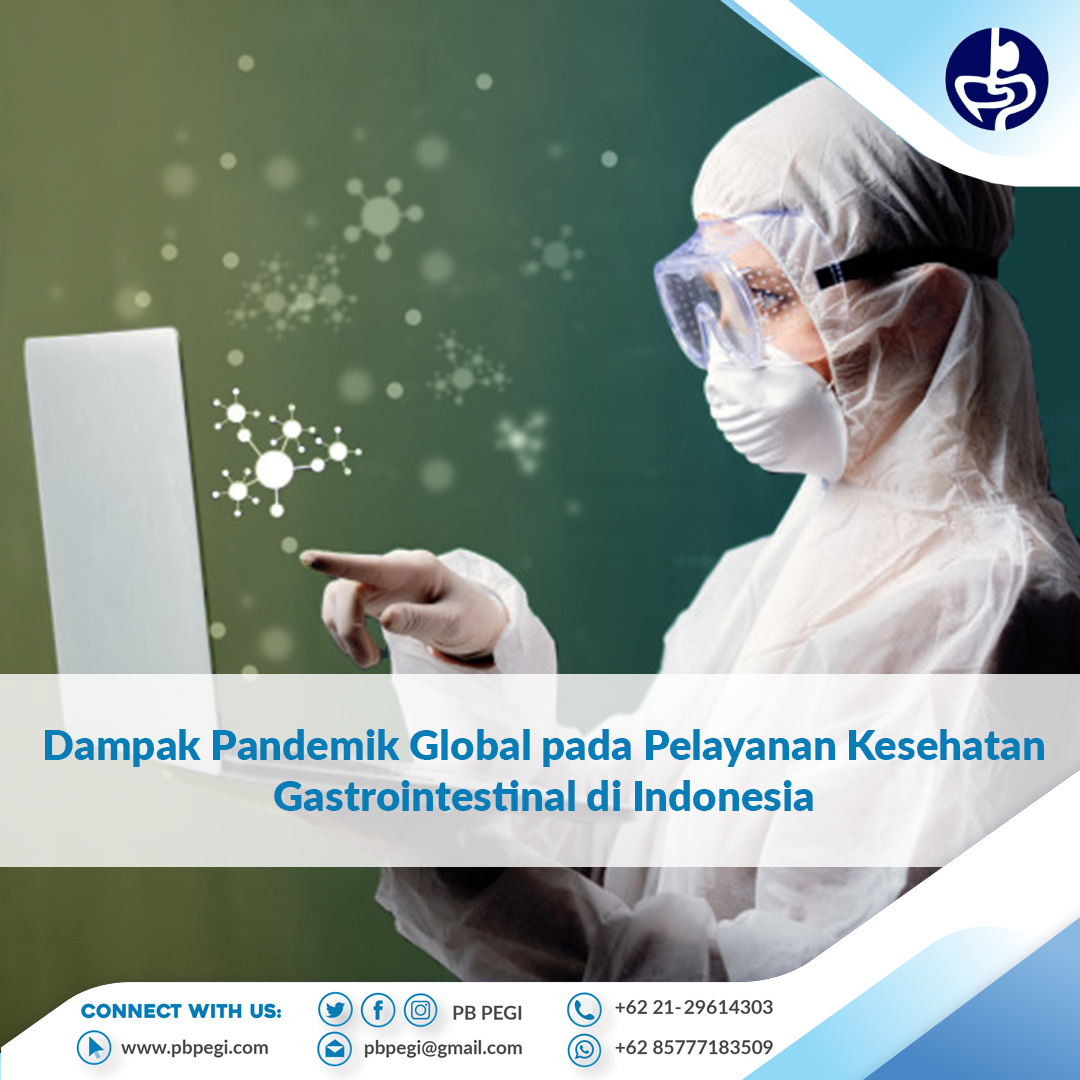The Impact of the Global Pandemic on Gastrointestinal Health Services in Indonesia

COVID-19 disease which initially attacked the lungs was proven to be able to attack other organs including our digestive system. How to transmit from one person to another who was previously known through droplets and contacts can actually be transmitted by aerosol and airborne. Because of aerosol transmission, gastrointestinal endoscopy is a high-risk action for transmission. Therefore, research on the impact of the global pandemic on gastrointestinal health services in Indonesia.
To answer this, research was conducted in May and June 2020 through questionnaires on clinical gastroenterology practices and gastrointestinal endoscopy during the Covid-19 pandemic in Indonesia. This research was carried out by the research team Dr. Ahmad Fariz Malvi Zamzam Zein, SpPD (FK, Unswagati Cirebon), dr. Rabbinu Rangga Pribadi, SpPD (FKUI / RSCM), Uswatun Khasanah (FK, Unswagati Cirebon), Dr. dr. Begawan Bestari, SPPD, K-GEH, MKes, FACG, FASGE, FINASIM (FK UNPAD / Hasan Sadikin Hospital), and Prof. Dr. dr. Ari Fahrial Syam, MMB, SpPD, K-GEH, FACP, FACG, FINASIM (General Chairperson of PB PEGI and Dean of FK UI). As mentioned above this research is motivated by the existence of a pandemic due to coronavirus (Covid-19) which urges increased safety in health services for both health workers and patients. Research conducted includes procedures for the practice of Gastroenterology and Gastrointestinal Endoscopy in the COVID-19 era. Seminat organizations, in this case the Indonesian Gastrointestinal Endoscopy Association (PEGI), have launched Clinical and Procedural Guidelines for the Gastrointestinal Endoscopy Unit during the Covid-19 Pandemic Period, but the implementation of these guidelines is still questionable. Therefore, this research wants to collect data related to the implementation.
The research data collection was carried out by survey method with the target respondents being doctors members of the Indonesian Gastrointestinal Endoscopy Association (PEGI) throughout Indonesia. This national-scale online survey consisted of 32 questions related to respondent characteristics, modification of gastroenterology practices, modification of gastrointestinal endoscopy practices, identification of risks to doctors, management of Covid-19 by respondents, and the impact of a pandemic on respondents’ professional practice. Data obtained from the survey were then analyzed using descriptive statistics.
The results of the survey analysis showed that the respondents of this study were 200 doctors with an age range of 34 to 76 years, with an average age of 50 years. Consists of internal medicine specialists with gastrointestinal endoscopy competence (62.5%), gastroentero-hepatology consultant (29.5%), participants of the Speasialis Medical Education Program (PPDS) Sp-2 gastroentero-hepatology, and participants of the Speasialis Medical Education Program ( PPDS) Sp-2 gastroentero-hepatology of children (0.5%).
Gastroenterology modification practices have been carried out in the scope of outpatient (95.5%) and inpatient (100%). In 70% of respondents stated that they had reduced their practice hours, 63.5% of respondents said that they had experienced a decrease in the number of patients. For polyclinic patients, 40% of respondents did by teleconsultation. Most respondents (70.5%) reported difficulty in conducting clinical research.
In the practice of gastrointestinal endoscopy, this study also found that 13% of respondents reduce working hours in the endocopy room, 35.5% of respondents limit the number of patients, 56.6% stop gastrointestinal endoscopy services.
The cases handled during the pandemic with upper gastrointestinal endoscopy with indication of upper gastrointestinal symptoms with alarm markings were 60.5%, bleeding both upper and lower was done by 73.5%. During the gastrointestinal endoscopy action, it turned out that respondents reported coverall use in 56% of respondents and 70% of respondents mentioned using N-95 masks. As for lower gastrointestinal endoscopy, 33% of respondents used coveralls and only 52% used N-95 masks. Though the risk of transmission is the same between the upper and lower gastrointestinal tract.
In this study also found that 15 out of 200 respondents, became suspicious or confirmed positive co-19. Most of the respondents 86% worked in places that affected the disaster and 34% of respondents felt that their PPE was inadequate.
Most respondents participated in handling Covid-19 (68.5%) and almost all of the respondents who participated were involved in the Covid-19 task force (98%).
From this study it can be concluded that doctors who practice clinical gastroenterology and gastrointestinal endoscopy are in a high-risk work environment. Modifications to work practices must be implemented for safety in health services. Most doctors have a direct role in Covid-19 management and are involved in the Covid-19 task force at various levels. Need attention so that doctors who work in po




 Users Today : 536
Users Today : 536 Total views : 2222923
Total views : 2222923 Who's Online : 4
Who's Online : 4